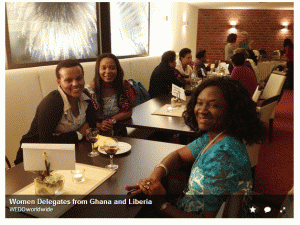BONN, GERMANY (June 11, 2013)-– Yesterday, in partnership with UN Women and WEDO on behalf of the Women Delegates Fund, the Governments of Liberia and Bangladesh hosted an informal cocktail reception and networking meeting for women delegates at the UNFCCC. The event was held in light of the COP18 Decision 23/CP.18 – ‘Promoting gender balance and improving the participation of women in UNFCCC negotiations and in the representation of Parties in bodies established pursuant to the Convention or the Kyoto Protocol’, as the first of many actions and initiatives to provide space for: networking and mentorship among women delegates of the UNFCCC, consideration and discussion of strategies for enhanced participation, and to highlight the achievements of women leaders in the negotiations.
The guests were welcomed by Iliya Sumana of Bangladesh and Sieane Abdul-Baki of Liberia with the following Opening Remarks:
Distinguished Delegates and Friends,
We are very pleased to have you here tonight and to have this space for networking and information sharing with delegates from across countries and regions.
The COP18 Gender Decision aims at promoting gender balance across delegations and it has helped to raise some very interesting questions and dialogue over the last few days, weeks and months on what are the challenges and opportunities this brings; and what are some strategies to reach this goal. Particularly of need to think about and discuss is our understanding of equity, not just across countries, but in this case, gender equitable actions to promote gender equality and how to engage both women and men in these strategies.
In 2012, the participation of women on national delegations reached an all-time high of 32%, and 19% of the Heads of Delegations were women. However, research shows that gender imbalances differ across countries and regions. Women’s participation in Eastern and Western Europe, for example, is at around 42%, while it is around 21% in Africa and the Asia-Pacific region. These differences can also be seen when looking at participation by UNFCCC negotiating blocks, with countries from the African Group, Least Developed Countries (LDCs) and OPEC having less representation of women on national delegations. This is precisely why we saw the importance of having LDC countries spearhead this networking event.
For myself and Sieane, we know first-hand the importance of strategic actions to enhance gender balance as our participation has been made possible through the support of the Women Delegates Fund, a Fund supported by the Governments of Iceland and Finland, and administered by WEDO. The WDF program recognizes that truly transforming representation within these processes requires more than just bringing women to have “seats at the table” but providing capacity building training and crucially, networking opportunities such as these- to exchange perspectives across countries on how to strengthen and enhance participation and to support each others work—particularly for women delegates who may be the only female delegate on a large delegation, as in my case.
Now, this informal evening is a space to meet each other and discuss these issues a bit further, as well as to get to know each other a bit better. There are a number of questions on the tables placed around the room which we would invite you to use to start discussion. As well as to provide feedback on further actions to take going forward. Thank you for coming and please enjoy your evening.
Delegates were very positive about the event and requested similar networking opportunities to be held at each meeting of the UNFCCC. Click to see slideshow of photos below:
For more information on the Women Delegates Fund, please contact Bridget Burns bridget@wedo.org.



